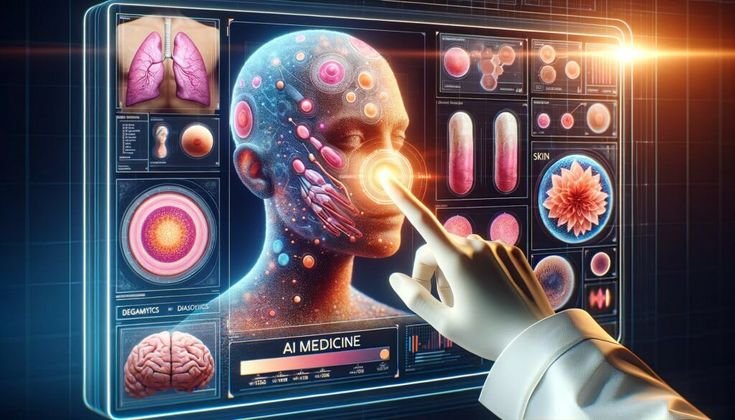The Allure and the Alarm

The promise of AI diagnostics companies in the USA has captivated the healthcare industry. In the USA, AI diagnostics companies have become the promise, capturing the healthcare industry with their ability to revolutionize patient care with advanced analytics and predictive modeling. Be that as it may, just beneath the sleekness of these cutting-edge innovations, a murky reality has risen to decimate the trust we put in this progressive arrangement
Deceptive Tactics and Misleading Claims
Many AI diagnostics companies in the USA pretend to be naive to save patients but use manipulative tactics to lure in unsuspecting patients. They’ve learned how to deceive you into believing their products are far less risky than they are — by exaggerating claims about accuracy and reliability, or by actively confusing you with negative-sounding codewords and deliberately vaguishing the limitations or risk components. Lead patients to believe that these AI-powered solutions are the panacea for their medical woes — while rarely do they take a moment to think about the true consequences that can happen.
The Facade of Ethical AI

The most alarming thing about the landscape of Ai diagnostics companies in usa, is that bias and discrimination are issues that keep reoccurring. However, the industry’s claims of ‘ethical AI’ are far more sinister than they let on. In many cases, these AI systems have been discovered to reinforce and sometimes even accentuate existing biases: specific demographic groups experience disproportionately incorrect diagnoses or delayed treatment. Such biases can come from the absence of data sets that are diverse in data, from built-in biases of the algorithms themselves, or, even worse, from embedded system biases.
The Exploitation of Sensitive Data
The collection and storage of sensitive patient data is necessary for the AI diagnostic process. Most of these companies have mismanaged this information and sold or given it away to third parties without that patient’s consent or knowledge. It’s a big bad throughout healthcare here just this blatant disregard for patient privacy and patient autonomy. The data can help patients control the situation and simultaneously may leave patients vulnerable to potential data breaches, identity theft, or other kinds of exploitation without their knowledge.
Prioritizing Profits over Patient Welfare
At the heart of this issue lies a disturbing trend: the preference for profits over patient welfare. In recent years AI diagnostics companies in USA, and the US have seen the rise of several AI diagnostics companies that put making money above ethical practice and have relied on skipping corners and compromising patient safety in the process. As a result of this search for money, substandard technologies have been developed, unfavorable researchers have been suppressed, and vulnerable people have been exploited.
Impossible Promises and Unfulfilled Expectations

Although Ai diagnostics companies in USA generally tone it down somewhat, there is one big thing that is unsettling: most of them make claims that are just impossible, using current AI tech. But sadly, these companies usually make promises of highly accurate and dependable diagnoses, early disease detection, and even personalized treatment recommendations, but the truth is that AI-powered systems have their limitations and frequently end up giving misleading diagnoses. Known as trusted technologies, patients who trust these devices are left disappointed when expected results do not occur and can experience delayed or inappropriate treatments, unnecessary anxiety, and more catastrophic scenarios.
Real-Life Consequences and the Need for Reform
We have to dwell on the real face of dark realities in the AI diagnostics companies in USA industry to understand the gravity of this situation. These technologies have misdiagnosed, mistreated and even harmed, and even harmed patients to be a sobering wake-up call that the entities who govern this sector must be held to account and be made transparent.
One example is a patient who was diagnosed as having a rare form of cancer through an AI-powered system, only to later be shown that the diagnosis was incorrect. Therefore, this created unnecessary and intrusive medical procedures, outsized emotional stress, and prolonged treatment. Just think of an example: an AI system misidentifies a patient’s symptoms, delaying diagnosis of a curable disease that later becomes a life-threatening disease.
If we would like to know what unseen dangers lie in the Ai diagnostics companies in usa, now is the time for action. This rapidly evolving industry needs a team effort to ensure their doctors are transparent, for tougher regulations and for a focus on ethical practices that patients, healthcare providers and policymakers have to demand. Only after can we know that the promise of AI for diagnostics will work for those they are intended to help.
FAQs
What are the main concerns with AI diagnostic companies in the USA?
The most obvious issues of AI diagnostics companies in the USA are deceptive marketing tricks, the use of discriminatory and biased algorithms, having access to patient data, and placing profit above patient wellbeing. These companies are often making wild statements about the accuracy and prowess of their equipment while downplaying their constraints and potential risks.
How are AI diagnostics companies in USA exploiting patient data?
AI diagnostics companies in USA have been found to mishandle lots of sensitive patient data, selling or sharing it to third parties without patient consent or even knowledge. This blatant disregard for patient and autonomy privacy destroys the trust that should characterize this industry.
What are the consequences of biased AI algorithms in diagnostic tools?
Diagnostic AI tools use biased algorithms and if this occurs, then there is no protection by algorithms to encourage accurate diagnoses and treatment of patients from certain demographic groups. The problem could be a lack of diverse data sets used to train the AI models, biases inherent in the model algorithms themselves, or biases that exist systemically (in the healthcare system.).
Can AI diagnostics companies in the USA make unrealistic promises?
Of course, there are a lot of AI diagnostic companies that have made claims that are just not doable today with today’s AI technology. As misled as these companies may be about how accurate and reliable their diagnoses and recommendations will be with their available systems ‘personalized’ treatment recommendations, early disease detection, etc., their use of AI-powered systems has numerous limitations that result in massive error and misdiagnosis.
What can be done to improve accountability and transparency in the AI diagnostic industry?
Rather, patients, healthcare providers, and policymakers need to band together to compel more regulation, tougher oversight, and improved ethical uses of the technology for AI in the diagnostic industry. To do this, we will need robust data privacy protections, unbiased and transparent AI systems, truthful marketing, and promises of AI systems.




Pingback: Can AI Diagnose Diseases? A Diagnostic Game-Changer - glotarhub.com
Pingback: The Sinister Side of Ai Diagnostics Companies in USA: Dark reality – HealthBlog